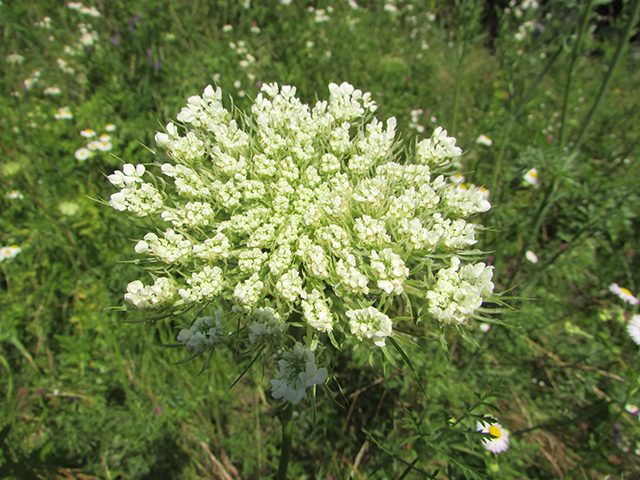Distinctly pretty and delicate, the wild carrot may be a natural treatment for cancer
08/19/2018 / By RJ Jhonson

Don’t let its tiny, delicate, white flowers lead you into underestimating the wild carrot. According to a study published in the journal BMC Complementary and Alternative Medicine, this plant’s oil extracts could have huge medicinal benefits, specifically, the ability to fight skin cancer.
Every year, more people in the U.S. are diagnosed with skin cancer than all other types of cancer combined. It is estimated that one in five Americans will develop the condition by the time they reach the age of 70. However, skin cancer is far from being the deadliest – in fact, the Skin Cancer Foundation considers it largely treatable. Early detection and treatment are key to surviving the disease.
In this study, scientists looked into the potential of the wild carrot (Daucus carota), also known as Queen Anne’s lace, as a treatment for skin cancer. This particular herb has been in use as a medicinal treatment for a wide range of health conditions, including diabetes, gastric ulcers, and muscle pain, among others. It also has notable diuretic, antibacterial, antilithic, and antifungal properties.
In particular, the researchers wanted to focus on the plant’s oil extract (DCOE). Prior inquiry revealed that DCOE has potent anti-ulcer, anti-inflammatory, and antioxidant qualities, as well as cytotoxic effects against colon, breast, and blood cancers. They wanted to know if the same anti-cancer qualities worked against skin cancer as well.
The researchers tested four fractions of DCOE on human HaCaT keratinocytes, a cell line used for in vitro research on the human skin. They used three types of cell cultures: HaCaT (non-tumorigenic), HaCaT-ras A5 (benign tumorigenic), and HaCaT-ras II4 (malignant). The scientists discovered that the pentane-based fraction (F2) of DCOE reduced the population of cancer cells. It also increased the expression of proteins that promote apoptosis – natural cell death – while reducing the expression of those that inhibit apoptosis.
The power of the elements: Discover Colloidal Silver Mouthwash with quality, natural ingredients like Sangre de Drago sap, black walnut hulls, menthol crystals and more. Zero artificial sweeteners, colors or alcohol. Learn more at the Health Ranger Store and help support this news site.
To test DCOE’s potential effects, the researchers created an animal model composed of male mice. They induced papillomas (warts) by applying 190 nmol of 7,12-Dimethylbenz anthracene (DMBA) in 0.2 mL acetone onto the animal’s back. They found that intraperitoneal injection with F2 fraction inhibited not just the occurrence of papilloma, but also the number and size of growths in those that did develop warts.
These led them to conclude that the F2 fraction derived from wild carrot extracts have anti-tumor effects, especially against chemical-induced skin cancer.
A few words of caution regarding the wild carrot
The wild carrot is safe for consumption and has been used since time immemorial as a source of nutrition and medicinal compounds. However, its appearance is stunningly similar to that of the hemlock’s, one of the most poisonous plants in North America. The two plants have differently shaped leaves, but their tiny, white, and distinctly grouped flowers make identification difficult for most amateur herb gatherers. One must take adequate care before harvesting wild carrot, whether as food or medicine.
Natural ways to treat skin cancer
Here are some natural treatments one can use for skin cancer:
- Eggplant – This fruit (it’s a fruit, like a tomato) contains solasodine glycoalkaloids which some studies have found effective against basal cell carcinoma, a type of skin cancer.
- Frankincense – This essential oil has been found to kill cancer cells thanks to its beta-elemene compound. Applying the oil directly onto the cancerous spot every day may help against basal cell carcinoma.
- Black raspberry – The oil from this berry fights cancer in several ways. First, it enhances the immune system when ingested. Second, it stops the spread of tumors when applied topically.
- Milk thistle – Extracts from this plant is known to have liver-friendly benefits, but it has also been shown to kill cancerous cells while sparing healthy tissue.
Get everything you need to know about skin cancer at Cancer.news.
Sources include:
Tagged Under: alternative medicine, cancer treatment, Daucus carota, hemlock, herbal remedies, Herbs, natural cures, natural medicine, natural treatment, Natural Treatments, Queen Anne's lace, skin cancer, Wild carrot, wild foods




















